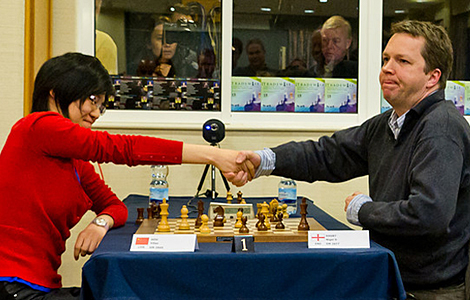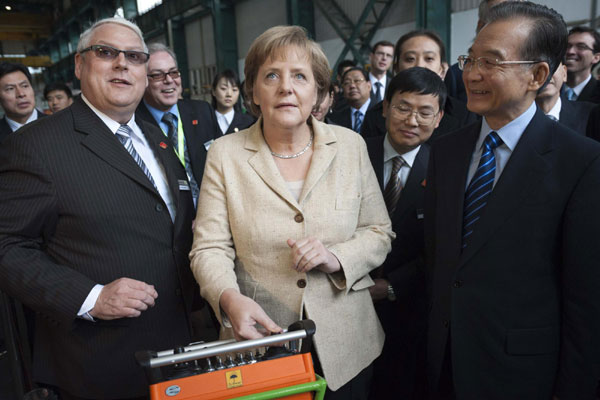China not out to purchase Europe: Wen
Updated: 2012-02-04 07:42
By Ding Qingfen (China Daily)
|
|||||||||||
GUANGZHOU - Premier Wen Jiabao said on Friday that China has neither the intention nor the ability to buy up Europe, answering concerns over the country's increasing investment in debt-stricken eurozone economies.
China is "willing to cooperate with Europe to fight the current crisis. Some people say this means China wants to buy Europe", the premier told a business forum in the southern city of Guangzhou.
Such a worry is unnecessary, although the nation encourages its companies to invest in the region, he said.
"This isn't a concern and doesn't fit reality. China doesn't have this intention and doesn't have this ability."
Wen stressed that China's investments in European nations are only at the fledgling stage, and China's investment creates benefits for both sides.
"If we join hands to combat the financial crisis and the debt woes, all the problems will be addressed," he said.
German Chancellor Angela Merkel, in China for a three-day visit to boost her host's confidence in Europe, also attended the forum along with executives from the energy, chemicals, engineering, banking and electronics sectors.
There are growing concerns in Europe that a recent wave of investment by Chinese companies and government-backed funds will give Beijing too much influence over struggling European economies.
In 2011, China's outbound direct investment gained a slight 1.8 percent to $60 billion, while China's investment in Europe gained by 94.1 percent to $4.28 billion, figures from the Ministry of Commerce showed.
Chinese construction equipment maker Sany Heavy Industry announced recently it would pay 324 million euros ($426 million) to buy 90 percent of Putzmeister, Germany's largest concrete pump maker.
In another recent deal, China State Grid has agreed to pay 387 million euros for a 25 percent stake in the national electricity grid of debt-stricken Portugal, Treasury Secretary Maria Albuquerque said on Thursday.
European leaders have called on China, which has the world's largest foreign exchange reserves, to invest in a bailout fund to rescue debt-stricken countries.
On Thursday, Merkel started her fifth official visit to China in six years as chancellor. On the first day of her three-day visit, China promised to consider how to get "more deeply involved" in resolving Europe's debt crisis.
On Friday she met President Hu Jintao before she flew to Guangzhou, home to more than 400 German companies.
Hu said China was ready to push forward the long-term, healthy and in-depth development of its strategic partnership with Germany over the decades to come.
During a forum in Guangzhou, Wen said nobody needs to worry about China's increasing investment in Europe and China also welcomes investment from Germany.
"We expect Chinese companies can make more investments and enhance cooperation with Germany. China encourages domestic companies of all types, including State-owned and private enterprises, to invest in Germany," he said.
"Germany is a country that is open to all. We warmly welcome the investment from China," said Merkel. "There are already many good examples."
Last year, Chinese computer giant Lenovo made the biggest purchase since it bought the IBM PC business years ago when it announced it would buy up the German computer firm Medion AG, a deal that will help Lenovo grab 14 percent of the German PC market.
"The brand of Lenovo is still new to German consumers and industries, and we expect the German government will care more about Chinese companies and their growth," said Yang Yuanqing, chairman of Lenovo.
"China welcomes investment from Germany and regards all the registered Germany companies as Chinese companies," said Premier Wen during the forum with enterprises from both sides in Guangzhou. In China, Germany is the largest investing nation from the European Union, and also a major nation that has transferred a lot of technologies to China.
"We expect China to provide the same treatment to German companies as their domestic counterparts," said Merkel.
"It's (investment in China) a win-win situation. We have absolutely no complaints here," said Martin Herrenknecht, chairman and managing director of tunnelling systems of Germany-based Herrenknecht AG, the world's largest tunnel boring machine provider.
"Without China, the financial situation could be worse."
China-Germany trade could reach $200 billion in two to three years, compared with the target of five years previously set by the two sides, said Wen.
Germany is China's largest trade partner in the EU, and its fourth largest worldwide, next to the United States, Japan and South Korea. Last year, China-Germany trade increased by 18.9 percent to $169.15 billion.
Cheng Guangjin in Beijing contributed to this story.
Hot Topics
Kim Jong-il, Mengniu, train crash probe, Vaclav Havel, New Year, coast guard death, Internet security, Mekong River, Strait of Hormuz, economic work conference
Editor's Picks

|

|

|

|

|

|








